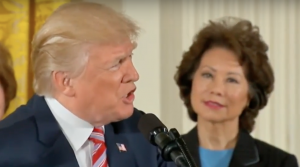President Trump signed a directive today to launch the Unmanned Aircraft Systems (UAS) Integration Pilot Program. The U.S. Department of Transportation (DOT) says in a statement that the program will “safely test and validate advanced operations for drones in partnership with state and local governments in select jurisdictions.”
The details of the program have not yet been released: the White House says that a Federal Register Notice will be published sometime in the next several days which will outline the details. But in statements released by DOT today and a White House press call to answer questions about the program, the broad goals of the program appear ambitious: “The program will help the USDOT and FAA develop a regulatory framework that will allow more complex low-altitude operations; identify ways to balance local and national interests; improve communications with local, state and tribal jurisdictions; address security and privacy risks, and accelerate the approval of operations that currently require special authorizations,” says the announcement. “…The pilot program will evaluate a variety of operational concepts, including night operations, flights over people, flights beyond the pilot’s line of sight, package delivery, detect-and-avoid technologies, counter-UAS security operations, and the reliability and security of data links between pilot and aircraft. Industries that could see immediate opportunities from the program include commerce, photography, emergency management, precision agriculture, and infrastructure inspections and monitoring.”
Drone operators hoping to see quick changes to regulations concerning the complex operations listed will need to be patient, however. The pilot program is designed to allow tribal, state and local governments and their industry partners to apply for permission to implement innovative drone programs. When all of the proposals have been evaluated, the DOT will invite no fewer than 5 partnerships to try out their programs.
The Integration Pilot Program is a way for the government to gather the data, evidence and use cases that they need to inform future drone regulation. Trying complex operations is an effective way of seeing how they work and identifying issues that need to be addressed; partnering with local government bodies to do that is an excellent way of both demonstrating the benefits of drone technology while gathering feedback and evaluating appropriate roles for local government in drone regulation.
It’s also a welcome indication that the White House has recognized the economic potential of the drone industry, and is determined to move forward in order to forestall the industry moving overseas. Citing figures from AUVSI, the DOT statement acknowledges the impact of the drone industry: “In less than a decade, the potential economic benefit of integrated unmanned aerial systems into the nation’s airspace is estimated to equal up to $82 billion and create up to 100,000 jobs.”
While it’s a further step towards drone integration, the new program is not a new set of laws or the launch of a new tool that will easily accommodate complex operations like BVLOS flight or flight over people immediately.
“Stakeholders will have the opportunity through this program to demonstrate how their innovative technological and operational solutions can address complex unmanned aircraft integration challenges,” said FAA Administrator Michael Huerta. “At the same time, the program recognizes the importance of community participation in meaningful discussions about balancing local and national interests related to integrating unmanned aircraft.”
“This program supports the President’s commitment to foster technological innovation that will be a catalyst for ideas that have the potential to change our day-to-day lives,” said Secretary Chao. “Drones are proving to be especially valuable in emergency situations, including assessing damage from natural disasters such as the recent hurricanes and the wildfires in California.”

Miriam McNabb is the Editor-in-Chief of DRONELIFE and CEO of JobForDrones, a professional drone services marketplace, and a fascinated observer of the emerging drone industry and the regulatory environment for drones. Miriam has penned over 3,000 articles focused on the commercial drone space and is an international speaker and recognized figure in the industry. Miriam has a degree from the University of Chicago and over 20 years of experience in high tech sales and marketing for new technologies.
For drone industry consulting or writing, Email Miriam.
TWITTER:@spaldingbarker
Subscribe to DroneLife here.








[…] The drone startup partners with the City of Reno under the FAA UAS Integration Pilot Program (IPP) to develop a river search-and-rescue program designed to equip the city’s fire department with […]